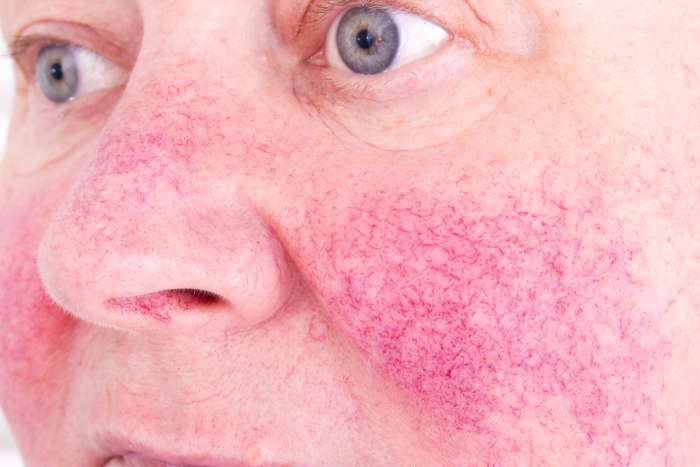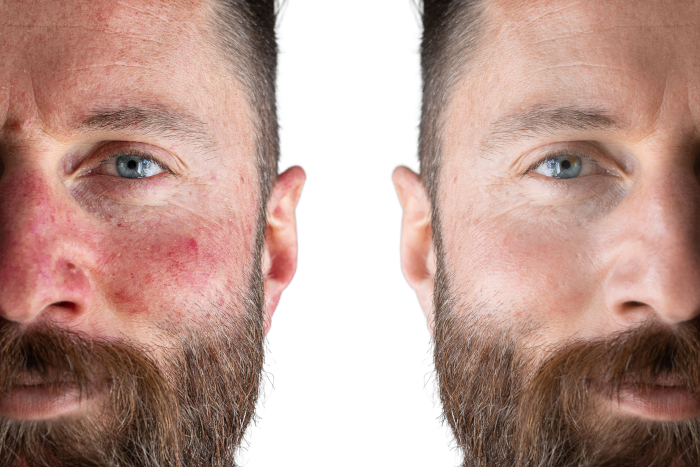Rosacea is a very common skin condition. However, patients struggle to find effective treatments. We understand the frustration of dealing with rosacea. At the Trillium Clinic, our solutions are designed to address rosacea at its cause, helping your skin heal and giving you the clear, healthy radiant skin you desire. Begin your advanced rosacea treatments today, and say goodbye to the persistent redness of rosacea.
What is Rosacea

The common signs and symptoms of rosacea include:
Facial redness: Persistent redness on the central part of the face, such as the cheeks, nose, forehead, and chin.
Flushing: Episodes of sudden and temporary facial redness or flushing, often triggered by certain factors like hot drinks, spicy foods, alcohol, or exposure to sunlight.
Visible blood vessels: Small, dilated blood vessels (telangiectasia) become visible on the skin surface, giving a spider-web-like appearance.
Papules and pustules: Red bumps (papules) and pus-filled pimples (pustules) resembling acne may develop on the affected areas.
Thickening of the skin: In some cases, over time, the skin on the nose may become thickened and bulbous, a condition known as rhinophyma.
Eye symptoms: In some individuals, rosacea can also affect the eyes, causing dryness, irritation, redness, and sensitivity to light.
What Causes Rosacea
Various factors can trigger or worsen rosacea symptoms, although they can vary between individuals. Common triggers include sun exposure, hot or spicy foods, alcohol, extreme temperatures, stress, certain skincare products, and medications that dilate blood vessels.
What are the Different Types of Rosacea?

Erythematotelangiectatic rosacea: Characterized by facial redness, flushing, and visible blood vessels.
Papulopustular rosacea: In addition to redness and flushing, it involves acne-like breakouts with papules and pustules.
Phymatous rosacea: This subtype is associated with thickening of the skin, most commonly on the nose (rhinophyma), but it can also affect the chin, forehead, cheeks, and ears.
Ocular rosacea: Involves eye symptoms such as dryness, redness, itching, and sensitivity to light.
How is Rosacea treated
Although there is no cure for rosacea, various treatment options can help manage the symptoms and control flare-ups. These may include:
Skincare modifications: Gentle skincare practices, including using mild cleansers, avoiding irritants, and protecting the skin from sun exposure, can help minimize symptoms.
Lifestyle adjustments: Identifying and avoiding triggers that worsen symptoms, such as certain foods or environmental factors, can be helpful. Managing stress and practicing stress-reducing techniques can also be beneficial.
Topical medications: Prescription creams or gels containing ingredients like metronidazole, azelaic acid, or brimonidine can help reduce redness, inflammation, and control papules and pustules.
Oral medications: In some cases, oral antibiotics or isotretinoin may be prescribed to manage inflammatory symptoms.
Laser or light therapy: Certain laser and light-based treatments can target visible blood vessels, redness, and skin thickening associated with rosacea.
HydraFacial
Embark on your journey to radiant skin
Although rosacea can be persistent, it does not affect overall health. Seeking support from healthcare professionals can help individuals manage rosacea and feel confident in their own skin. If you are suffering from rosacea make an appointment here to see one of the dermatology providers at the Trillium Clinic in Chapel Hill. We will provide an accurate diagnosis, recommend appropriate treatment options, and offer guidance on management and prevention. We are currently accepting new patients from Chapel Hill, Carrboro, Hillsborough, Pittsboro, Mebane, Durham, Burlington, Cary, and surrounding cities, who suffer from rosacea. Call us today to discuss the various treatment options.

